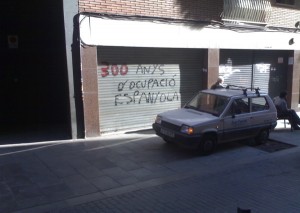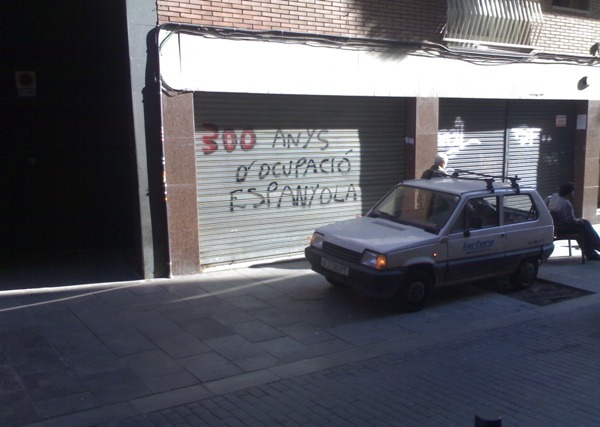
From 2007-2008, my family and I lived in Vilassar de Mar, a pretty seaside town north of Barcelona where most of the natives prefer to speak Catalan, the heart language of Catalunya and the first language kids speak in school.
The fact that we nearly mono-lingual Americans were struggling to learn Spanish, and could manage only a few words of Catalan, significantly narrowed the possibilities for our social life. In other words, most of our friends were other ex-pat Americans or Europeans married to Spaniards.
I did have an awkward encounter with a Catalan nationalist one day. He stood in my friend’s apartment and regaled me for at least an hour on the history of Catalunya in Catalan, but surreal Catalan history lessons notwithstanding, we enjoyed living in Spain, especially the time we spent in our adopted little village of Vilassar. We loved the unhurried meals with friends (although we’ve gotten out of that good habit), 10-minute walks to the beach, life without a car, and especially the ultra-close proximity of our local bank, grocery store, hardware store and bread shop to our nice second floor apartment. What wasn’t apparent to me until later, was that even there, on the sleepy shores of the Mediterranean, there was a good side of the proverbial train tracks and a bad side. Fortunately for us, and thanks to our good friends who found our apartment for us, we lived on the good side closer to the seaside and Vilassar’s primary train station. Recent immigrants and others who couldn’t afford such exclusive digs, lived in not-so-nice apartment buildings farther away from both.
The better my Spanish got, the more often I caught people referring to “Barato” as if it were part of Vilassar. One day, confused, I asked for an explanation and learned that some people call the not-so-nice part of town where the Moroccans and other immigrants live, “Barato” or “Cheap.” Having tasted the bitter fruit of being treated as a “foreigner” during my purgatorial trips to the Barcelona immigration office, I felt a sort of Golden-Rule inspired solidarity and sympathy for the immigrants in “Barato.” Maybe not exactly “do unto others as you would have them do unto you,” but something like “having been treated unfairly, treat others with the fairness.”
Lest any Catalans who might read this suspect I’m unfairly publicizing the social tensions in their region, I readily admit that my own mostly middle- or upper-class community of Broomfield, Colo., U.S.A., has its own depressed and reverse gentrified neighborhoods of economically poor people and recent immigrants. Even nearby Boulder, Colo., which in myriad ways professes to champion the cause of people in need, recently showed itself to be full of people who do not, in fact, want to do so if it means more “homeless” will come live in their neighborhood.
But back for a moment to Spain. Through La Viña, our church in Barcelona, I got to know Lazaro, the head of one of an immigrant family. He and his wife and children had immigrated to Spain from Bulgaria to find a good job and for a while they made a decent living. When Lazaro lost his job, they scraped by for a while until they ran out of money. Lazaro’s wife and kids had to move in with their landlord while Lazaro lived on the street. He couldn’t find a job, and they couldn’t afford to move back to Bulgaria. They had a few run-ins with the local social services system. Lazaro, for his part, was understandably and perpetually stressed out. He always seemed to need something more than what was offered. His stories didn’t always seem to add up. La Viña, whose German head pastor ran a nearby soup kitchen, helped him and his family as much as it could, and some other missionary friends of ours took a Christmas offering for them, but they remained right on the edge of desperation for probably four months.
Finally, just before we returned home to the States in the spring of 2008, Lazaro and his family somehow found a way to return to Bulgaria. The last I heard Lazaro was thriving in Bulgaria as a mushroom farmer. (Incidentally, all my conversations with Lazaro were in Spanish. For some reason, I always found it easier to understand Spanish spoken by other immigrants instead of by native speakers.) I wonder now if my suspicion of Lazaro’s need during the worst of his ordeal had more to do with my (mostly) subconscious desire not to have to inconvenience myself with cross-cultural conversations and the problems of someone else’s family.
For the last several years, the United Nations has publicized its Millennium Development Goals (MDGs), which have the good and reasonable aim to curb fundamental global problems. It seems to me, however, that the more fundamental issue that needs to be addressed is the zero-sum “Us versus Them Dilemma.” All to often, if “they” win, that means “my” group loses.
The reason this doesn’t get much attention is because our social identity and identification with a particular language, history, ethnicity, etc., aren’t as easily quantifiable as the MDGs. Therein lies the difficulty. It’s easy to say “let the Golden Rule be our guide,” but quite another thing to give that principle pride of place in practice. There is no easy solution to the “Us versus Them Dilemma,” but whether we are citizens of different nations, or members of different races or religions or tax brackets, we must learn to see ourselves and the image of God that we all share in “the other.” Until then, no significant progress will be made on any front, from how we deal with the personal and corporate pain in our past, to how we view immigrants in our community, to how many people are “lifted” out of poverty by 2015.
In the end there is no “Us” versus “Them,” only “Us.”


